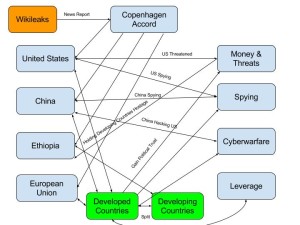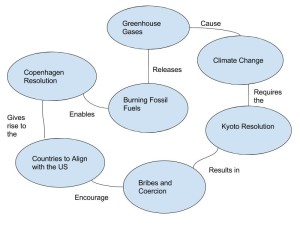The diagram starts with the Wikileaks article regarding the Copenhagen Accord. It shows the relationship between the Accord and the main countries mentioned in the Wikileaks report. The United States is a developed country connected to money and threats, spying and leveraging political allies. China is a developed country; like the United States, China also had a hand in spying through a cyber attack on the CIA. This was an attempt to find out what information the United States gathered on their spying activities. The next country is Ethiopia, which is a developing country. Ethiopia a part of political leveraging and threats made by the United States. The developing countries ended up thinking that the developed countries were taken advantage of them because of their political weakness in contrast to the larger more powerful countries. This does not seem like an attempt to reduce carbon emissions between the large and small countries alike; it reads more like a Dean Koontz book. However, this is the world we live in; doing what is right is never as easy as it should or could be. Even when we can see the problems that we have created and know the steps that are required to slow the process of global warming we find ourselves hampered by the political system and financial greed. These are the reasons that have created the environmental mess that we call our home and will never be the way that we recover from the damage that we have done to our planet.
I like truth even though at times it can be tough to accept, but with the truth comes answers. I am thankful that Wikileaks published this information; we now know at least some of the problems we face as a society, when it comes to changing our actions. We have to start changing society’s mindset; this is done through persistence, transformability, and adaptability. Human action has changed the state of the Earth; this started approximately two centuries ago, during the industrial revolution. Humans affect climate change through mitigation and adaptation. Mitigation causes less greenhouse gas emissions, but also leads to more climate change, which promotes adaptation that creates better environmental impacts. In order to really make a change the first step we have to do is re-engineer our global economy to a low-carbon model that will redirect billions of dollars to counteract the damage we have done to the environment. The second step is for each person to create his or her own action plan on mitigation; by planning where we live might be the biggest factor in the amount of greenhouse gas we emit. Additionally, by choosing low-impact food; by eating less animal-based food for a plant-based diet will lower greenhouse emissions. Lastly, there is always a possibility to buy carbon offsets; however, this can lead to an ethical question. One can make a case that every person should do their part to reduce their carbon footprint and not just buy a credit that allows them to pollute as much as they want (Pennslyvania State University 2016).
References:
Pennslyvania State University. Climate Change. 2016. https://www.e-education.psu.edu/geog030.


